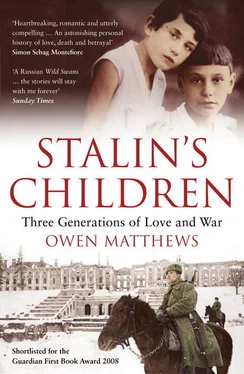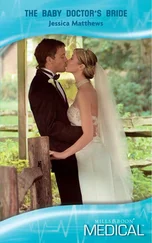Mila was soon earning enough of her own money to subsidize secretly the tiny household budget her husband gave her to buy clothes and books. Though they’d both grown up poor, my mother enjoyed spending money in a way that my father has never been able to. She’d always loved beautiful things, and as soon as she was able she bought old furniture and pictures.
Mila followed Sasha’s advice: by summer 1971 she was pregnant. I was born on 9 December 1971, at Westminster Hospital, which Mila found ‘as luxurious as the Kremlin clinic’. It was a difficult delivery because of my mother’s deformed hip, and I was pulled into the world with calipers. The doctors told her that she had ‘a beautiful baby’ – a remark which impressed her greatly, and which she often repeated to me during my childhood. Soviet doctors usually kept their opinions to themselves. My father scraped together the deposit for a £16,000 Victorian terraced house on Alderney Street, which my mother decorated with paisley patterned orange wallpaper she’d found on sale at Peter Jones. For the first time since very early childhood, Mila was finally part of a proper family of her own.
In the winter of 1978, nine years after she had left, my mother returned to visit the Soviet Union, taking me and my baby sister Emily with her. We stayed at Lenina’s apartment. I remember a constant stream of visitors weeping in the hallway as they embraced my mother, who they never expected to see again. I found everything utterly different from England, from the queues in the bread shops to the vast snow banks and the palatial Metro. I thought I understood exactly what Pushkin meant about the smell of Russia. It was a distinct odour, partly cheap disinfectant, partly (though inexplicably) the smell of a certain Soviet brand of Vitamin C tablet, tangy and artificial. Russian people smelled, too, in a way that English people never did, an overwhelmingly powerful body odour which was not unpleasant, though I felt its carnality was somehow not very decent or respectable.
Though I had travelled a lot as a child to visit my father in various academic postings around the world, in Russia I was for the first time in my life overwhelmed by my own foreignness. Everyone wanted to show me how things were ‘ u nas’, or chez nous, and asked me whether English chocolate was as good as Russian Bears Wafers (answer – yes), whether we had champagne or toy soldiers or snow or even (this from a particularly moronic and patriotic boyfriend of my cousin Olga’s) cars as fine as Soviet ones. Even aged seven, I could tell that Soviet cars were rubbish. But despite the vividness of Russia to my imagination, I never, even then, felt that this was anything other than a strange and foreign place.
Nostalgia for a lost homeland is a particularly Russian affliction; at parties given by my mother’s émigré Russian friends, the hostesses tried to recreate a lost world of Russianness in suburban London. The tables groaned with sturgeon and caviar, pickles and vodka, the air was thick with the smoke of Russian papiros cigarettes, and the talk was of recent or planned trips back to the Rodina. But my mother, for all her emotional nature, was never sentimental about the Motherland, and I don’t believe that she ever really missed Russia – at least not after she got over her first, wrenching bout of homesickness soon after her arrival in Britain. Throughout my childhood she was always full of praise for what she saw as the peculiarly English virtues of punctuality, thoroughness and good taste; the only thing which irritated her was English thrift, which she saw as meanness of spirit. One thing she shared with her fellow emigres was a deep contempt for the Soviet regime, as well as a love for the latest cynical political anecdotes from Russia. One of her favourite jokes was about Brezhnev’s mother: the old woman visits her Party boss son in his luxurious seaside villa and nervously admires the pictures, furniture and cars. ‘It’s lovely, son,’ she says. ‘But what will you do if the Reds come back?’
Mila’s example proved infectious. One by one, almost all her friends and relations were to either leave Russia or marry foreigners. In 1979, Lenina’s elder daughter Nadia and her Jewish husband, Yury, who had shouted at the photographers at Mila’s wedding, got leave to emigrate, taking their baby daughter Natasha to Germany. Sasha cried hysterically at the airport and tried to run after his daughter as she went through passport control, hobbling on his artificial leg. ‘I’ll never see you again!’ he shouted.
Six months later, Sasha was summoned by his boss at the Ministry of Justice, who stood at his desk and shouted at Sasha for not having informed his Party organization that he had not only a sister-in-law but a daughter in the West. Sasha collapsed with a massive heart attack right there in the Minister’s office, and died that afternoon in hospital. Nadia was not allowed back from Germany for the funeral, and for ever after blamed herself for her father’s early death.
My mother’s shy balletomane friend Valery Golovitser, who introduced my parents, finally got an exit visa after nine or ten applications. In 1980, along with thousands of Soviet Jews, he took his family to the United States. He soon left his wife Tanya and finally came out as a homosexual, living with his long-time lover Slava in New York and organizing ballet tours by Russian artists.
Valery Shein, Mervyn’s bohemian friend from the Festival, had a wildly successful career in theatre management, became rich and famous, and married a beautiful Russophile Englishwoman in 1987. She was famous among Valery’s friends for having stood for an hour in a queue for bananas and then having bought only one kilogram – a normal Soviet shopper would have bought all they could carry.
Georges Nivat’s fiancée Irina Ivinskaya was let out of the Gulag at the end of 1963. She married a well-known dissident and later emigrated to Paris. Her mother Olga, Pasternak’s Lara, stayed in Moscow, where she died in 1995.
Mila’s niece Olga followed her sister to Germany in 1990 by way of a fictitious marriage with an Englishman, leaving her daughter Masha behind in Moscow to be brought up by her grandmother, my aunt Lenina. When Masha finished school she, too, left, for a cancer operation in Germany, and stayed there, eventually dying of the disease. Lenina was left alone in Moscow, where she died of a heart attack in May 2008.
My father has never lost his wanderlust. Throughout my childhood he would leave for months at a time to take up visiting professorships at Harvard, Stanford, Jerusalem, Ontario, Australia. I doted on the wonderful letters he sent, illustrated with coloured sketches of Australian lizards, pirates and little caricatures of himself in funny situations – falling out of boats, driving a car on the wrong side of the road. And I missed him, terribly, and waited desperately for his letters. Several times I flew alone – as an ‘unaccompanied minor’ complete with a label with my particulars securely fastened to my coat, like Paddington Bear – to join him in Cambridge, Massachusetts, and San Francisco, California. Men alone, we ate pizza in our pyjamas and stayed up late watching Godzilla films on the television. He taught me to sail dinghies on the Charles River basin in Boston.
At home, the situation was less harmonious, though I never for a moment felt anything less than absolutely loved. Rather the contrary: with no epic battle to fight, my mother turned her energies to the people closest to her – her husband and children – and the result was often overpowering. A terraced house in Pimlico was far too small to contain that dynamo of emotional energy. My father’s reaction to the frequent dramas of the household was to retreat into his own private world, stalking away in silence from the dinner table after a minor argument, leaving my mother in tears, and retreating into the fastness of his study. There were times when the tension in the house crackled like frost.
Читать дальше











